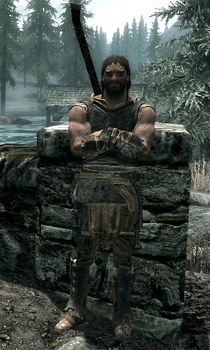Gender becomes even more interesting when one examines the marriage feature in Skyrim. Once a PC obtains the Amulet of Mara, he or she can marry one of several eligible NPCs of either gender. Bethesda scripted the marriage function to operate without regard to gender; in other words, gay marriage is legal in Skyrim. This programming choice allows players to run homosexual PCs while simultaneously rendering the PCs sexual orientation inconsequential to gameplay. In fact, from a gameplay perspective, the profession of the spouse is the only factor worth considering; merchants usually mean better available goods and perhaps more household income, but warriors can actually go on quests with the PC, providing backup in combat and assistance with carrying loot. While marriage itself provides other strategic benefits as well (see below), the gender of one's mate is utterly irrelevant.
A side effect of this arrangement that, because the default courtship initiating dialogue for many NPCs is gender-neutral toward the PC, a paradoxically gender-specific picture of romantic love emerges. Once the PC establishes a positive relationship with an eligible NPC (usually through completing a minor miscellaneous quest), the default opening dialogue (the line an NPC speaks when the PC comes into range, but before the player chooses the "Talk" option) for male NPCs is...
 | |||
| "You've been a good friend to me. That means something." |
 |
| "It's a fine day with you around." |
While the fact that Skyrim allows gay marriage (for PCs at least -- there are no overtly homosexual NPC pairs) might not sit well with moral conservatives, the fact that the sexual options for the PC are completely limited to marriage falls right in line with the traditional Judeo-Christian view of sexuality. Moreover, the physical aspect of marriage is only implied, never depicted. The most explicit reference to PC sex is the "Lover's Comfort" bonus: a 15% boost in skill improvement speed for 8 hours after sleeping in the same bed as one's spouse. While sex outside of marriage is discussed (most notably in Haelga's Bunkhouse), there are no explicit images of sex in the game. Even if the PC is in the bedroom of a married couple (while attempting to steal something, for example), all the player will see is two clothed figures, perhaps even wearing armor, lying separately on top of the covers of a double bed:
 |
| Jarl Idgrod Ravencrone and her husband/steward Aslfur, alseep in their bed [his position is slightly glitched in this picture] |
Despite the game's M rating, the PC has no options for sex outside of marriage, nor will the PC witness any sexual behavior. Furthermore, if one's spouse dies (on an adventure or in a dragon attack), one cannot remarry, and there are no scripts for divorce in the game's code.
Skyrim presents a very progressive view of gender roles, but a fairly traditional (and demure) picture of marriage. This arrangement has a double-sided effect on the player's moral agency. One the one hand, the player, regardless of gender or sexual orientation, is able to create a character with which he or she can fully identify. On the other, issues of sexual promiscuity and fidelity are completely off the table. While one could create a scenario in which one's spouse might not like the constant running off on adventures with other NPCs, such a story is directly contradicted by the in-game dialogue:
 |
| This PC [not mine] married Camilla Valerius, a merchant from Riverwood |
In total, TES V: Skyrim presents marriage as a partnership of equals, regardless of gender or orientation. Whether the PC's spouse is a valuable asset in battle and dungeon-delving or a shrewd steward of the household income and resources, the institution of marriage takes a position of high honor, unsullied by some of the more complex moral entanglements presented in the game.
False, gender does effect gameplay moderately the trait allure gives 10% better prices with the opposite sex and realistically a majority of traders are male so female is realistically better cause there are more discounts available to you
ReplyDelete